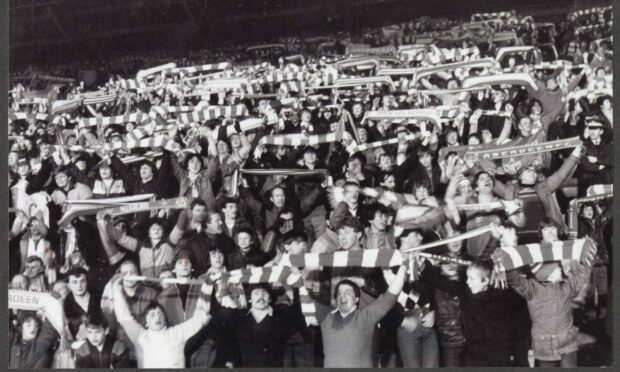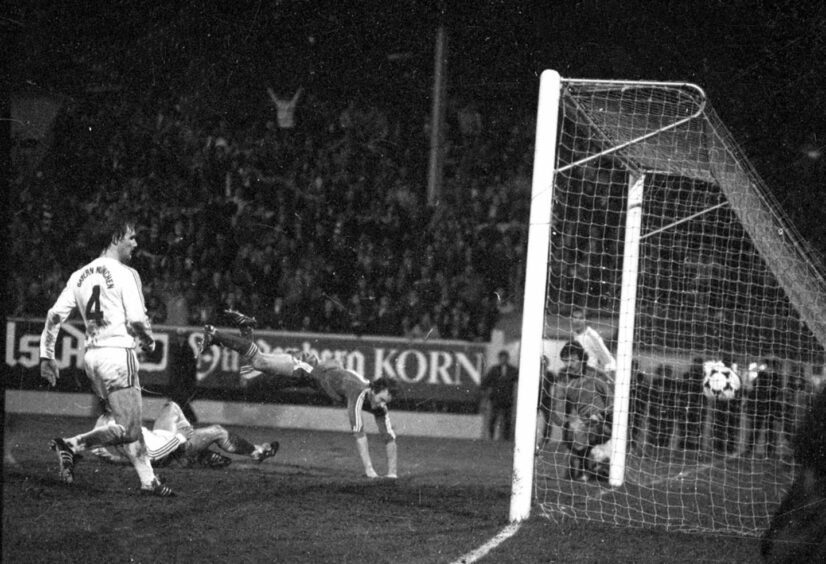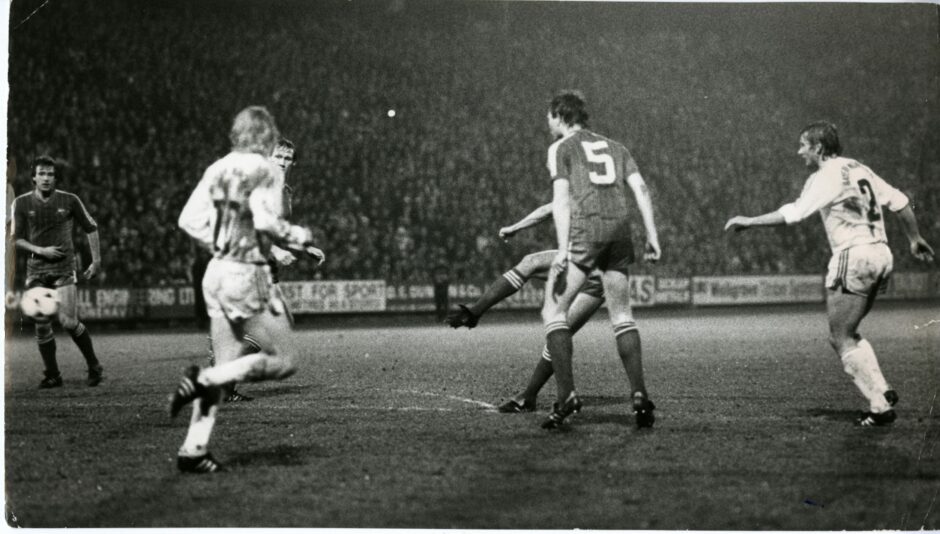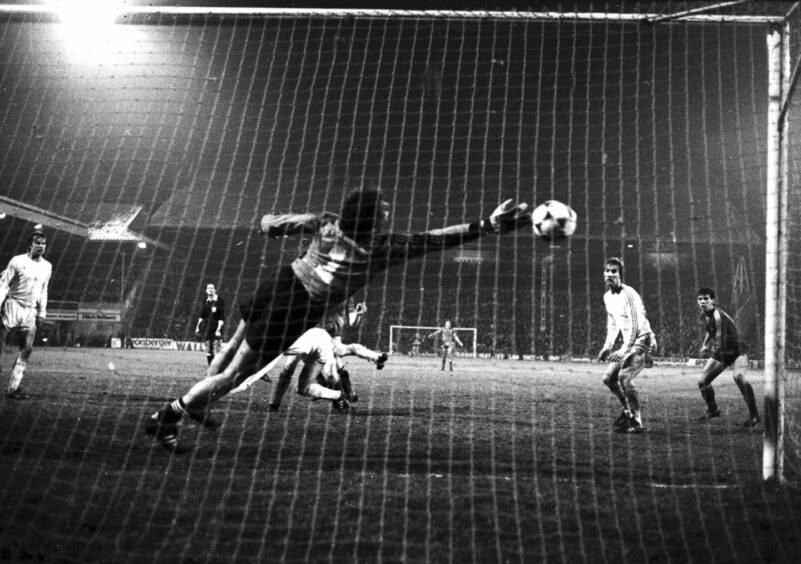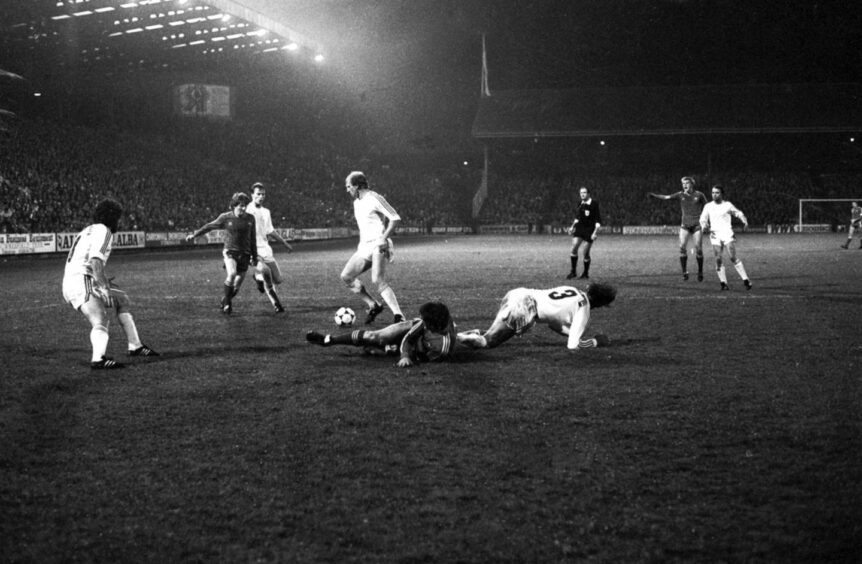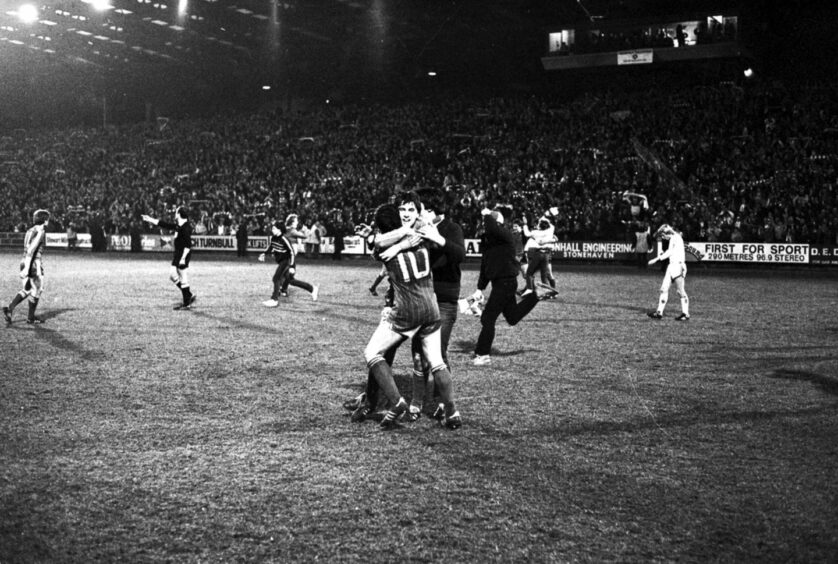It was a night such as Pittodrie had never seen; a raucous, reverberating roller-coaster of different emotions as Aberdeen produced what many believe was the greatest display in their history.
Yet before Alex Ferguson’s side sealed a coup de grace and completed a victory against Bayern Munich that sent shockwaves round Europe in March 1983, they left their supporters on tenterhooks and constantly wondering whether they were on the edge of a windfall or a catastrophe.
At one stage, the revivalist singing and cheers were almost completely silenced when the hosts took the lead through Klaus Augenthaler after just 10 minutes and a stunned bewilderment enveloped the arena.
His strike meant that the Scots, who had performed impressively in gaining a 0-o draw in the first leg of the tie, needed to score at least twice to progress to the semi-finals of the European Cup Winners’ Cup.
It was going to be an uphill task but Fergie’s fans, as usual, kept the faith.
One supporter told me: “We had been waiting for this match for weeks and the atmosphere around the stadium was off the scale.
“When the Bayern players walked out, we thought: ‘Wow, they look big and confident’ and (Karl-Heinz) Rummenigge was built like the side of a house.
“But there was a confidence among the spectators by that stage, because the boss had built a side who were just like him.
“They refused to be knocked out of their stride and they had this incredible approach to dealing with setbacks.
“When Bayern went in front early on, a few (of the 24,000 crowd) were worried. And things got worse later on. But that was part of the joy of supporting Aberdeen.
“You knew it was going to be thrilling and exciting and you lived for these big European nights almost as much as the players did.”
We always knew with the boys that we had, particularly the creative guys, that they would carve out openings for us. It was our job to finish them off.”
John Hewitt
Falling behind meant there was no margin for error for the hosts, but it also provided motivation to avoid the sort of cagey shadow boxing that often pervaded these contests, where rivals probed rather than punched.
Aberdeen had no reason to fear the Germans, whose coach, Franz Beckenbauer, had been cocksure and bravado-laced in his conviction that the Dons had performed as well as they could in Bavaria and his men would go through the gears and demonstrate their superiority in the second leg.
He was left with plenty to reflect on when Neil Simpson equalised in the 39th minute and the resounding cry of “Here We Go” boomed across the venue.
Yes, his men still had the edge, but the glint in the eyes of Willie Miller, Alex McLeish, Gordon Strachan and their confreres told its own story.
Youngster John Hewitt was among those who listened to Ferguson in the dressing room and his words defined the manager’s philosophy that genius is an infinite capacity for taking pains. That, and not relaxing for an instant.
Hewitt recalled: “It was a concentration thing with Fergie. He always used to tell us that, especially in Europe, we had to focus for the whole 90 minutes.
“The second half was about our concentration levels being at their absolute maximum and, if the opportunities came along, to try our best to take them.
“We always knew with the boys that we had, particularly the creative guys, that they would carve out openings for us. It was our job to finish them off.”
Nobody in the Dons colours had any doubts about the international class in the Bayern ranks and how comfortable they were in possession.
But that second period was like a glorious dream for those who initially feared the worst before being served up a climax straight from a Frank Capra movie.
Yet it was the very opposite of a wonderful life when McLeish attempted to clear a diagonal ball, but only succeeded in diverting it into the path of Hans Pflugler, who responded with a magnificent volley from 20 yards.
It was one of the most mesmerising, wonderful occasions in any of our lives.”
Aberdeen supporter
With an hour gone, the exit door surely beckoned. Aberdeen needed to score twice and prevent their adversaries from adding any more goals.
They had to gamble and push forward, but keep their fortifications secure at the same time.
Once again, there was a brief hush inside Pittodrie but only as the prelude to the Red Army unveiling a wall of positive noise for their heroes.
Ferguson heard the din and decided to make changes. He brought on John McMaster for Stuart Kennedy, a move that provoked a heated argument between the latter and his gaffer that was only ever going to finish in one way and that was with the Govan Godfather saying: “Get aff the f***ing park”.
He also replaced Simpson with Hewitt and, despite some groans from the stands, any apprehension was soon transformed to exhilaration as Miller and his colleagues launched a ferocious onslaught in the last 15 minutes.
Muller mullered by Black’s header
Bayern never really knew what hit them in that tumultuous denouement. Nor did they fathom what Strachan and McMaster were plotting when they seemed to get in a muddle over taking a free kick.
The cunning ploy – which had been discussed as far back as the previous summer – lulled the visitors into a false sense of security, then, suddenly, as a cross hurtled towards McLeish, his header was altogether too much for keeper Manfred Muller.
It was 2-2 and a giant swell of noise cascaded around Pittodrie.
By this stage, even the Germans’ sangfroid was in danger of melting. But there was more, much more, in the blink of an eye.
In fact, many of the supporters had barely stopped celebrating that goal when, remarkably, they were leaping into the air to cheer the Dons grabbing another and going into the lead.
It was hardly a thing of beauty – as if anybody cared – but it’s etched forever in the mind of the man who scored it, the recently introduced Hewitt.
A goal that will never be forgotten
He said: “The ball ended up with John (McMaster) and I recall the flight of the ball going towards Eric (Black) and him getting a header in.
“My first reaction was to turn and move towards Eric, looking for any knock-down or scraps. But although the keeper should have flipped the effort over the bar, he got it all wrong and palmed it downwards.
“I came in a touch too early and slipped, but thankfully, I managed to make contact and it went straight through the keeper’s legs and into the net.
“Everybody went mental – and it shook the very foundations of the stadium. And it was just a fantastic place to be that evening.”
There had never been such a cacophony and crescendo at Pittodrie since the old ground was opened in the 1920s.
Strangers hugged one another, grown men and women used language which would have made a nun blush, and the players were lifted into the stratosphere by the bedlam which erupted.
One supporter said: “I was told later that people could hear the noise miles away in Aberdeen and they realised the Dons were winning.
“It was one of the most mesmerising, wonderful occasions in any of our lives.”
Masterstroke helped Aberdeen beat Bayern Munich
Ferguson admitted afterwards that he thought his team would be eliminated after they had conceded the second goal.
But he added: “We’ve played better than this, but it was marvellous the way we fought back twice and then won.
“Substitutions are often a manager’s nightmare. Sometimes they come off and on other occasions they don’t.”
However, this was a masterstroke from his bag of tricks and while Aberdeen had only progressed to the semi-finals, this result was the catalyst for them overcoming Real Madrid in the final in Gothenburg two months later.
They knew they had the right stuff. Beating Bayern defined them.
